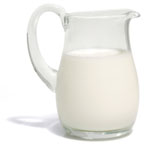Mediterranean Diet Basics
The basics of the Mediterranean diet can be broken into 9 important areas of change for your health:
1. Vegetables -
This one's pretty easy. It’s hard to eat too
many vegetables...
2. Legumes - Making beans your choice for
a starch...
3. Fruits and nuts - Fruit is the perfect snack...
4. Cereals - Whole grains are really good for you...
5. Fish - More fish,
less meat...
6. Olive oil - This really means eating more
monounsaturated fat...
7. Dairy products - The traditional
Mediterranean diet doesn’t have
dairy products as a major focus...
8. Meats - Less meat and
lean meats...
9. Alcohol - There is good evidence that moderate
use of alcohol is good for you...
Need more information? Read about the research!
Just Tell Me What to Eat!
The Delicious 6-Week Weight Loss Plan for the Real World
Timothy S. Harlan, MD, FACP has counseled thousands of his patients on healthy, sustainable weight loss. Now he's compiled his best tips and recipes into a six-week plan for you to learn how to eat great food that just happens to be great for you.
Get the prescription for better health as well as healthy weight loss, including:
What to eat
How to cook it
When to eat it
What to eat at a restaurant
What to eat if you're in a hurry
and best of all....
Why eating great food is the best health decision you'll ever make.
The Mediterranean Diet
No. 7 - Dairy
 The traditional Mediterranean diet doesn’t have dairy
products as a major focus. When dairy is part of meals it is
usually as yogurt or cheese. For most people decreasing the amount
of dairy and low-fat dairy is key.
The traditional Mediterranean diet doesn’t have dairy
products as a major focus. When dairy is part of meals it is
usually as yogurt or cheese. For most people decreasing the amount
of dairy and low-fat dairy is key.
Lactose intolerant? Here's more information about eating healthy when you're lactose intolerant.
Dairy products and information:
Blue Cheese
Butter
Buttermilk
Buttermilk, in Baking
Buttermilk, Definition
Buttermilk, in Dressings
Buttermilk, Making
Cheddar Cheese, Low Fat White
Cheese, Blue
Cheese, Cottage
Cheese, Cream
Cheese, Cream, Fat Free
Cheese, Feta
Cheese, Fontina
Cheese, Goat
Cheese, Low Fat White Cheddar
Cheese, Monterey Jack
Cheese, Mozzarella
Cheese, Parmigiano-Reggiano
Cheese, Pecorino-Romano
Cheese, Ricotta
Goat Cheese in Sauces
Milk
Milk, Evaporated
Reduced Fat Cheese
Sour Creams
Yogurt
Yogurt Cheese
Research Articles - Dairy in The Mediterranean Diet
You can read more about dairy in the Mediterranean Diet in these articles:
10 Things You Need to Know About Reading Food Labels: There are so many different types of foods out there that make claims about being healthy. The term "natural" is a good example of packaging that can be confusing. There is no regulation for the term "natural" and you could be purchasing a food that is made with 50% lard or is mostly sugar.
10 Things You Need to Know About Health Claims on Food Labels: The FDA allows health claims to be made on foods, but the assertion does have to meet certain criteria.
Avoid Colorectal Cancer: Drink Your Milk! A study of 45,306 men between the ages of 45 and 79 and without a history of cancer were followed for seven years by researchers in Sweden (Am J Clin Nutr 2006;83:667-73). The study assessed their level of dairy product intake and correlated the subjects’ intake to the incidence of colorectal cancers of various types: colorectum, colon, proximal colon, distal colon, and rectum.
What is Lactose Intolerance? The main sugar found in milk is lactose and is actually made up of two sugar molecules bound together (a di-saccharide). The body can’t absorb lactose and it must be broken down into the two sugar molecules (mono-saccharides) glucose and galactose.
Dairy products, calcium, and fat intake: The National Dairy Council would have you believe that three servings of dairy products per day will help you lose weight. That's not quite true, as the original research followed people who had not previously been getting enough calcium going on a reduced-calorie diet that included the recommended three servings of low-fat dairy products in their diet plan.
Small Changes Can Have a Big Impact: You probably are aware that being overweight has a negative impact on your blood pressure, and that high blood pressure can lead to stroke and heart attack and even death. Losing weight is the obvious answer, but how much weight do you have to lose to make a difference in your heart health?

